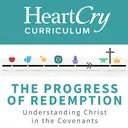00:00
00:01
Lesson 9 - The Prophetic New Covenant
Series The Progress of Redemption
8,242 ( 7,944 | 298 )
The Progress of Redemption: A 12 part series on understanding Christ in the covenants. A teaching by HeartCry Missionary Society Coordinator, Hunter Gately. Every Friday.
| Sermon ID | 31722184463687 |
| Duration | 20:55 |
| Date | Mar 18, 2022 |
| Category | Teaching |
Add a Comment

